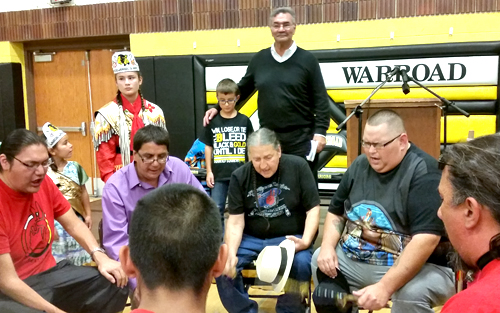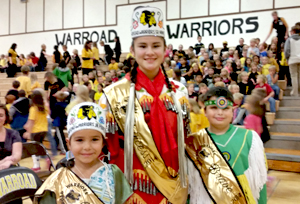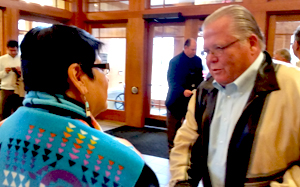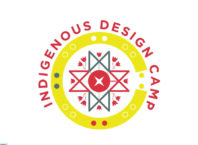 In its 30
In its 30
year quest to influence teams to change their names, mascots and
logos from those that are offense to Native Americans, the National
Coalition Against Racism in Sports and Media is making strides.
Thousands of high schools and colleges across the country have felt
the pressure and given up names which encourage stereotyping of
indigenous people.
NCARSM,
which is based in Minneapolis, still has work to do before the
thousands of offensive team names still in use are relegated to the
annals of history. The organization’s current strategy is to go
after the National Football League’s Washington team, a nationally
prominent team whose name is a racial slur and whose tradition of
mocking Native American people is seen as particularly vile.
“We
believe that when the Washington team changes, everyone else will
follow,” NCARSM board member Clyde Bellecourt said. He also said
the Washington team has a tradition of upholding institutional racism
that goes far beyond the current disagreement over its name. The team
was last in the National Football League to allow – in October of
1961 – non-white players on its roster, a move that prompted their
former supporters, the American Nazi Party, to protest outside RFK
Stadium.
But as
NCARSM focused its efforts on organizing a major rally against the
Washington team (who play the Minnesota Vikings at TCF Bank Stadium
on the campus of the University of Minnesota Nov. 2) one of its board
members, the organization alleges, Alan Yelsey – without the
knowledge or blessing of others within the organization – was
mailing threatening letters to schools with disparaging team names.
Yelsey and NCARSM have since parted ways.
Warroad
Public Schools superintendent Craig Oftedahl was among those who
received the rogue letters, which reportedly threatened to sue the
district if it failed to give up its Warriors team name and logo.
Oftedahl’s first impulse was to call Henry Boucha, a prominent
local Ojibwe community leader and former member of the Minnesota
North Stars and U.S. Olympic hockey teams.
“I was
surprised as hell when Craig called me,” Boucha said. “I thought
we were in the clear regarding the name change issue. We had already
gone through this with the Coalition back in 1989.”
In 1989,
after two years of discussion, Warroad Public Schools settled
out-of-court with NCARSM, then led by Clyde Bellecourt’s
now-deceased older brother Vernon Bellecourt. At the time Warroad
agreed not to use an Indian mascot and to reaffirm with the local
Ojibwe community its support of the Warriors name and logo.
“NCARSM
dropped its objections after it was verified that the Indian
community, the Indian Parent Committee and our Indian Education
Department all supported the use of the Warriors,” Boucha said.
“The name comes directly from our Ojibwe history. Our warriors
secured Warroad and the Lake of the Woods area after a long war with
the Dakota. The logo was designed by our own Indian people.”
Warroad is
within the territory of the Red Lake Nation. The school district also
serves Native students with affiliations to Leech Lake, White Earth,
Bois Forte and two Canadian reserves – Northwest Angle Band 33 and
Northwest Angle Band 37.
After the
NCARSM Facebook page received a flood of angry messages from Warroad
residents and hockey fans around the country, the organization
invited Boucha to address its board.
Warroad is
well known in hockey circles for the disproportionate number of
Olympians it has produced. The small city on Lake of the Woods near
the Canadian Border (population 1,800) has sent seven hockey players
to the Olympic Games, including Boucha, Bill Christian, Dave
Christian, Gordon Christian, Roger Christian, Gisele Marvin and T.J
Oshie.
“I
educated the Coalition on the history of Warroad and how proud we are
of the heritage we have there. Most of these people weren’t around
in 1989 and had no idea we’d been through all of this before,”
Boucha said. 
Boucha
told the story of Ay-Ash-A-Wash, the chief of Warroad during the heat
of the war for the Lake of the Woods region. Ay-Ash-A-Wash was in a
battle at Two Rivers, 40 miles west of Warroad, when he was badly
wounded and played dead. One of the Dakota warriors, according to the
oral history, scalped him and left him for dead.
Ay-Ash-A-Wash
managed to crawl away and made his way back to Warroad. Most thought
he had been lost in battle and there was a great outpouring of joy
when he returned to his people. Years later, Ay-Ash-A-Wash’s son
Na-May-Poke, a wise man who valued education, donated land from his
allotment on the north side of Warroad for the community’s first
school. He asked that the school’s teams be called the Warriors in
honor of Ojibwe warriors who fell in battles past.
NCARSM
president David Glass apologized to Boucha for the errant letter and
extended an invitation for Boucha to join its board, which he
accepted. The former hockey great and current film and television
producer said he hopes to utilize his position “to do as much good
as possible.”
Boucha
arranged for the NCARSM board to visit Warroad where, on Oc. 1, they
participated in a pipe ceremony and celebration to rededicate the
Warriors name and logo.
Hundreds
of school children, parents, teachers and community members attended
events at Warroad High School and Warroad Gardens & Olympic Arena
where they sang the school’s fight song and clapped along to a drum
performance of honoring songs by Midnight Express. Speakers at the
events included NCARSM board members Norma Renville, David Glass,
Clyde Bellecourt, Henry Boucha, American Indian Movement Grand
Governing Council Chairman Keith Lussier and Warroad Public Schools
superintendent Craig Oftedahl.
 NCARSM
NCARSM
members apologized to the community and encouraged its young people
to uphold, through positive action and behavior, the time-honored
Warrior tradition they represent.
Gabe
Shaugabay, a member of the White Earth Nation, and a junior hockey
player at Warroad High School, said he was crushed when he first
heard the Warriors name might have to be changed. After the
rededication ceremony, the 17 year-old defenseman was elated.
“My
whole life I had watched my older cousins and then my step-brother,
play for the Warriors,” Shaugabay said. “I always dreamed of
being a Warrior too when my time came. Just then they threatened to
take it away from us. When I heard that we got to keep our name I was
just so happy. As a Native person it makes me really proud to
represent our school as a member of the Warroad Warriors hockey
team.”
PHOTOS: (Top) Warroad Ojibwe community leader and former Olympian/Minnesota North Star Henry Boucha stands over the Midnight Express drum as they play an honor song celebrating the rededication of the Warroad Warriors team name. (Photo by Jon Lurie)
(Middle) Warroad powwow royalty joined over 1000 members of the northern Minnesota community in rededicating the Warroad Warriors name and logo. (Photo by Jon Lurie)
(Above) Frank Marvin, past president of Marvin Windows and Doors, Warroad’s largest employer, greets NCARSM board member Norma Renville upon arrival in the city. The Marvin company provided its private airplane for the Coalition’s members’ flight from the Twin Cities. Frank Marvin pledged a generous donation to aid the Coalition’s efforts to convince Washington’s NFL team to change its name. (Photo by Jon Lurie)






